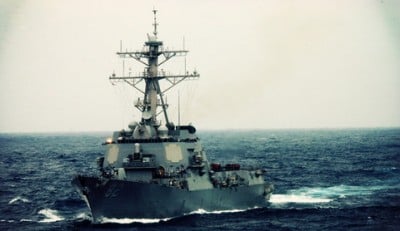

| Online: | |
| Visits: | |
| Stories: |

| Story Views | |
| Now: | |
| Last Hour: | |
| Last 24 Hours: | |
| Total: | |
Encircling, Containing China: US Ratchets-Up Tension in the South China Sea

By Tony Cartalucci
The United States, as part of its stated agenda of raising tensions in the South China Sea to encourage cooperation across Southeast Asia with the US in encircling and containing Beijing’s regional and global rise, has included several high-profile naval and aviation incidents. However, there is a legal battle lurking just behind these more spectacular headlines, and once again the United Nations is being brought in and undermined in the process.
The Associated Press in their article, “Beijing to ignore South China Sea ruling,” reported that:
China said on Saturday that it would ignore the decision of an international arbitration panel in a Philippine lawsuit against Beijing’s sweeping territorial claims in the South China Sea.
“To put it simply, the arbitration case actually has gone beyond the jurisdiction” of a UN arbitration panel, said Rear Adm Guan Youfei, director of the foreign affairs office of China’s National Defence Ministry.
The Philippines has filed a case in the United Nations under the UN Convention on Law of the Sea, questioning China’s territorial claim. An arbitration panel is expected to rule on the case soon. The Permanent Court of Arbitration ruled last year that it has jurisdiction over the case despite China’s rejection.
While the Associated Press portrays the lawsuit as “Philippine,” it is in reality headed not by the Philippines, but by a US legal team led by Paul S. Reichler of the Boston-based law firm Foley Hoag. Inquirer.net in an article titled, “US lawyer for PH expert in maritime boundary cases,” would reveal that not a single lawyer representing the Philippines is actually Filipino:
The lawyer leading the Philippine team in its fierce legal battle against China belongs to a select group of elite lawyers with extensive experience in representing sovereign states before the International Tribunal on the Law of the Sea (Itlos) in Hamburg, Germany, according to Chambers Global, which ranks law firms and lawyers across the world.
Paul Reichler of the Boston-based law firm Foley Hoag has specialized for more than 25 years in land and maritime boundary disputes, the law firm said on its website.
Reichler works with four other lawyers from the United States and the United Kingdom, in arguing the country’s case before the UN arbitral tribunal in The Hague, The Netherlands.
Foley Hoag represents the most powerful corporate-financier interests on Earth, and is an integral part of expanding their power and influence across the globe. That Foley Hoag is involved in Washington’s goal of encircling and containing one of the greatest threats to Washington and Wall Street’s hegemony not only in Asia, but globally, is no surprise.
Part of America’s agenda in the South China Sea is to provoke and then portray tensions in the region as being solely between China and its neighbors, with the United States feigning the role as peacekeeper – thus justifying its continued military, political, and economic “primacy” over Asia.
Such an appraisal is hardly conjecture. The corporate-financier funded and directed policy think tank, the Council on Foreign Relations (CFR) published a paper titled, “Revising U.S. Grand Strategy Toward China,” penned by Robert Blackwill – a Bush-era administrator and lobbyist who has directly participated in Washington’s attempts to maintain hegemony over Asia.
Blackwill’s paper states (emphasis added):
Because the American effort to ‘integrate’ China into the liberal international order has now generated new threats to U.S. primacy in Asia—and could result in a consequential challenge to American power globally—Washington needs a new grand strategy toward China that centers on balancing the rise of Chinese power rather than continuing to assist its ascendancy.
Indeed, a US policymaker openly admits that the US perceives itself as possessing and seeking to maintain “primacy in Asia,” primacy being defined by Merriam-Webster as, “the state of being most important or strongest.”
The United States then, literally an ocean away from Asia, presumes “primacy” over an entire region of the planet, and is openly seeking to deny the very nations within that region “primacy” over their own destiny, peoples, and resources.
It is an open, modern proclamation of imperialism.
It is also the true reality that underlines US foreign policy in the South China Sea and explains why an American and British, not a Philippine legal team has spent years trying to exact a ruling from the UN and other “international” organizations regarding Beijing.
In this context, it is quite clear why Beijing plans to ignore the ruling.
However, China’s ignoring the ruling was already considered by US policymakers and the US law firm “representing” the Philippines.
In a Wall Street Journal article titled, “Q&A: Taking China to Court Over the South China Sea,” Paul Reichler of Foley Hoag would respond to the question of, “what if China simply ignores a judgment that goes against it?” by stating (emphasis added):
In more than 95% of international cases — litigation and arbitration before various international courts and tribunals — the states comply with the judgment, even if they are unhappy with it. There are at least two reasons for this. First is reputation and the influence that comes with it. The second reason is that many states understand it is to their advantage, and the advantage of others, to live in a rules-based system. Now, in the case of China, we see a country that is a great power that wishes to project its influence across the international community. China also advertises itself as the anti-imperialist great power, in contrast to the U.S., Russia and others. Think of the economic advantages that will accrue to the richest and most powerful nation in the region if these disputes are resolved and investment in resource extraction from the South China Sea begins.
Unfortunately for Reichler, Foley Hoag, and the US-dominated “rules-based system” China is expected to comply with, too many examples of this system’s abuse in recent years has preceded the ruling against China. The UN’s role in the invasion, occupation, and destruction of Afghanistan, Iraq, and Libya are perhaps the most extreme examples, with the UN’s complicity (either directly or through inaction) in the destruction of Syria and Ukraine, and sanctions leveled against Iran and others other examples of the UN simply being used to enable Western geopolitical ambitions and justify Western military, socioeconomic, and political aggression across the globe.
The true foundation of Wall Street and Washington’s “international order” is clearly, “might makes right.” For Beijing and its expanding military presence in the South China Sea and its attempts to circumvent “international” arbiters in favor of bilateral talks with nations being pressured by the West to confront Beijing, appears not only to be China’s strategy of choice, but a strategy that is incrementally drawing out Washington’s true agenda in the region and making it increasingly complicated for complicit governments in Asia to continue their cooperation with the West.
Whether or not Washington’s necessity to exert increasing pressure on governments across the region to toe the line in America’s proxy war against Beijing will finally force Asian governments to abandon this risky and costly game remains to be seen. But Beijing is playing a game with home-field advantage – building military capabilities that are backed by logistical networks leading back to the mainland that will match and inevitably exceed US capabilities in the region.
Avoiding a rush to conflict with the United States as Japan mistakenly did in the lead up to World War II will ensure China sustainably creates and expands a deterrence that will first ward off US attempts to maintain or expand primacy across the region before finally rolling US primacy back altogether. For the rest of Asia, it is paramount that they themselves create a regional balance of power predicated on military deterrence coupled with economic cooperation, that excludes attempts by the US to create conflict that will cost the entire region peace, stability, and most importantly, prosperity.
Tony Cartalucci, Bangkok-based geopolitical researcher and writer, especially for the online magazine “New Eastern Outlook”.
Articles by: Tony Cartalucci
www.globalresearch.ca contains copyrighted material the use of which has not always been specifically authorized by the copyright owner. We are making such material available to our readers under the provisions of “fair use” in an effort to advance a better understanding of political, economic and social issues. The material on this site is distributed without profit to those who have expressed a prior interest in receiving it for research and educational purposes. If you wish to use copyrighted material for purposes other than “fair use” you must request permission from the copyright owner.
For media inquiries: [email protected]


